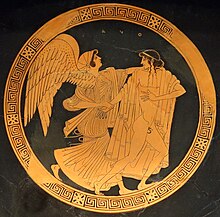Tithonus
Appearance


In Greek mythology, Tithonus (Ancient Greek: Τιθωνός, Tithonos) was the lover of Eos (Aurora), Goddess of the Dawn. He was a prince of Troy, the son of King Laomedon by the Naiad Strymo.
Quotes
[edit]- The goddess of the Dawn, like her sister the Moon, was at times inspired with the love of mortals. Her greatest favorite was Tithonus, son of Laomedon, king of Troy. She stole him away, and prevailed on Jupiter to grant him immortality; but, forgetting to have youth joined in the gift, after some time she began to discern, to her great mortification, that he was growing old. When his hair was quite white she left his society; but he still had the range of her palace, lived on ambrosial food, and was clad in celestial raiment. At length he lost the power of using his limbs, and then she shut him up in his chamber, whence his feeble voice might at times be heard. Finally she turned him into a grasshopper.
- Thomas Bulfinch, The Age of Fable (1855)
- But when the Golden-thron’d Aurora made
Tithonus Partner of her rosie Bed,
(Tithonus too was of the Trojan Line,
Resembling Gods in Face and Form Divine)
For him she strait the Thunderer address’d,
That with perpetual Life he might be bless’d:
Jove heard her Pray’r, and granted her Request.
But ah! how rash was she, how indiscreet!
The most material Blessing to omit;
Neglecting, or not thinking to provide,
That Length of Days might be with Strength supply’d;
And to her Lover’s endless Life, engage
An endless Youth, incapable of Age.
But hear what Fate befell this heav’nly Fair,
In Gold enthron’d, the brightest Child of Air.
Tithonus, while of pleasing Youth possess’d,
Is by Aurora with Delight caress’d;
Dear to her Arms, he in her Court resides,
Beyond the Verge of Earth, and Ocean’s utmoft Tides,
But, when she saw grey Hairs begin to spread,
Deform his Beard, and disadorn his Head,
The Goddess cold in her Embraces grew,
His Arms declin’d, and from his Bed withdrew;
Yet still a kind of nursing Care the show’d,
And Food ambrosial, and rich Cloaths bestow’d:
But when of Age he felt the sad Extream,
And ev’ry Nerve was shrunk, and Limb was lame,
Lock’d in a Room her useless Spouse she left,
Of Youth, of Vigour, and of Voice bereft.- Homeric Hymn to Aphrodite;
William Congreve, "Homer's Hymn to Venus", Works, iii (1725)
- Homeric Hymn to Aphrodite;
- Wake now my loue, awake; for it is time,
The Rosy Morne long since left Tithones bed,
All ready to her siluer coche to clyme,
And Phœbus gins to shew his glorious hed.- Edmund Spenser, Epithalamion (1595)
- O happy Tithon! if thou know’st thy hap,
And valuest thy wealth, as I my want,
Then need’st thou not—which ah! I grieve to grant—
Repine at Jove, lull’d in his leman’s lap:
That golden shower in which he did repose—
One dewy drop it stains
Which thy Aurora rains
Upon the rural plains,
When from thy bed she passionately goes.- William Alexander, Earl of Stirling, Aurora (1604)
- Rouse Memnons Mother from her Tythons Bed,
That Shee thy Cariere may with Roses spred.- William Drummond of Hawthornden, "Song", Poems, i (1616)
- That Shee...] modernised: "That she may thy career with roses spread:"
- Me only cruel immortality
Consumes; I wither slowly in thine arms,
Here at the quiet limit of the world,
A white-hair’d shadow roaming like a dream
The ever-silent spaces of the East,
Far-folded mists, and gleaming halls of morn. - I ask’d thee, ‘Give me immortality.’
Then didst thou grant mine asking with a smile,
Like wealthy men, who care not how they give.
But thy strong Hours indignant work’d their wills,
And beat me down and marr’d and wasted me,
And tho’ they could not end me, left me maim’d
To dwell in presence of immortal youth,
Immortal age beside immortal youth,
And all I was in ashes. - Release me, and restore me to the ground;
Thou seëst all things, thou wilt see my grave:
Thou wilt renew thy beauty morn by morn;
I earth in earth forget these empty courts,
And thee returning on thy silver wheels.- Alfred, Lord Tennyson, "Tithonus";
Cornhill Magazine (1860)
- Alfred, Lord Tennyson, "Tithonus";

